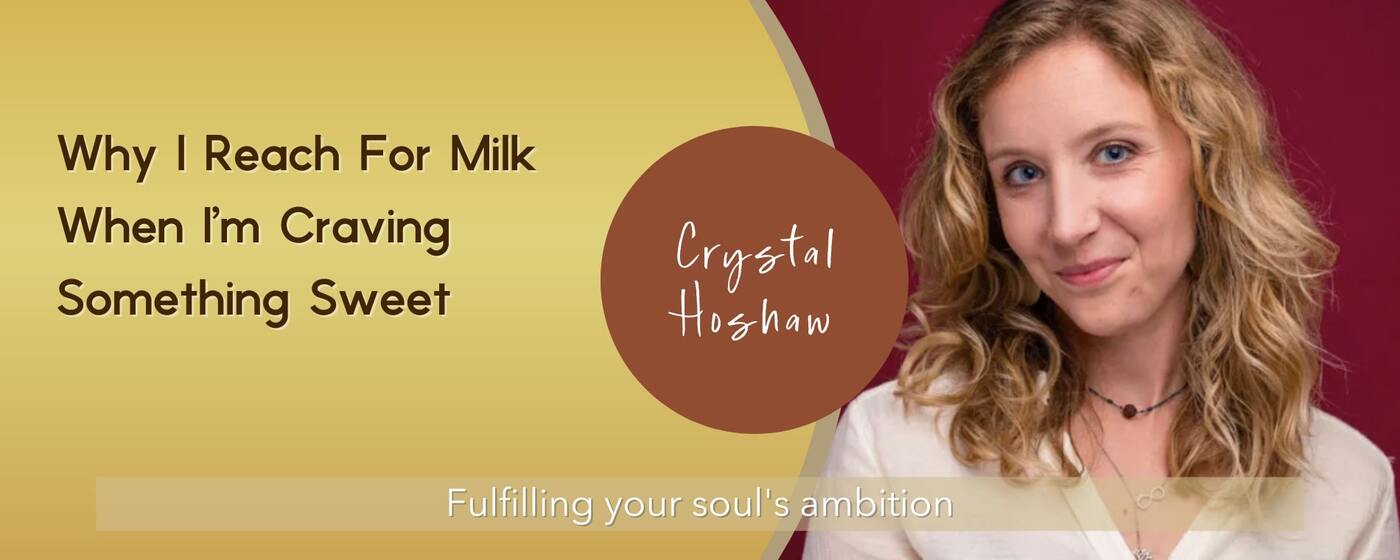
Why I Reach For Milk When I’m Craving Something Sweet
When I was a kid, I often had trouble going to sleep. I would plod down the steps in a pink frilly rayon nightgown, my mother clasping my hand.
She’d place a kid-sized plastic cup, also pink, in the microwave with what couldn’t have been more than a half cup of milk. Sixty seconds later, my belly would be full of warm liquid, and my eyelids would get a little heavier.
Then back to my room, under the covers, and mom’s singing would send me off to sleep.
Fast forward to now, and milk is still one of my favorite comfort foods. These days, I take it a little differently.
If I find myself restless before bed, or if my stomach is grumbling as though it didn’t get enough dinner, milk is my go-to choice.
I’ll put a cup or two in a saucepan with a tablespoon of ghee and a dash each of turmeric, cinnamon, coriander, and clove. As I stand there and stir, I watch the spices swirl together while the yellow oil of the ghee blends smoothly into the creamy white.
This is when the ritual begins.
The fragrance and color wake up my senses. The stillness of standing, sometimes patiently, sometimes impatiently, on my kitchen floor grounds me. The more I surrender to the process, the more present I become.
My life is not always slow enough to incorporate, let alone appreciate, little rituals like these. But when it is, life takes on a sweetness all its own.
The emotional power of sweet
There are obvious reasons that we crave the taste of sweet. Conventional wisdom tells us that sugar is highly addictive and in nearly everything we eat. But what is it about sweet that lures us with such a siren’s song?
When we came into this world, our first meal was sweet. When we were held to the breast, our lips tasted the sugary sweetness of the nourishment that came to us from our mother’s body. Even if we were formula fed, that substance mimics the natural sweetness of human breast milk.
I can only speculate about how powerful the subconscious memory of the first latch must be. Separated from the mother’s body and exposed to the cold air, the newborn might be searching for some reassurance that their needs will be met in this strange, new world.
Milk is their first evidence.
Beyond the emotional power that milk must hold over humankind, and even animal kind since before we were primates, there are several other reasons why sweet taste calls to us so strongly.
In Ayurveda, it isn’t just sugar that has a sweet quality. Water is the simplest form of sweet taste.
Imagine that feeling when you finally get a glass of water when you’re parched on a hot day. It’s easy to understand why people in ancient India who didn’t have ready access to ice cream shops and patisseries might have viewed water as sweet.
Very few things are sweeter when you’re looking for relief from the sweltering heat, and very things are more essential to our survival.
Rice is another simple food that is sweet in Ayurvedic cooking. I was surprised when I learned this, but give some plain rice a taste and see if you can sense the subtle sweetness.
Then there are refined carbohydrates, one of the most common cravings. Whether in the form of bread, buns, muffins, or pastry, flour is yet another sweet tasting food.
And there is milk. Milk has a long history in ancient India as a food of the gods. It is the food that is bestowed by sacred cows, who represent the mother of the universe. It is the favored food of impish little Krishna, the blue-faced child god who played in the pastures of Vrindavana.
There are some scientific reasons milk is a good choice for sweet cravings, too. Because milk is high in both fat and protein, it is a great food for the brain and nerves.
Healthy fats build up the protective coating of the nerve cells, known as myelin or majja dhatu in Ayurveda. Consuming fats helps to prevent these protective sheaths from eroding. This means that milk, or other sweet (non-sugary) foods that are high in fat and protein, actually help the body to heal stress and anxiety.
How’s that for sweet taste?
Sweetening life
According to Ayurveda, sweet taste doesn’t only come from food. Our words, thoughts, and experiences can be imbued with sweet quality, too.
When we hold hands with a lover and rest our heads on their shoulder, we are evoking sweet taste in our life. Why else would we honor them with the monikers ‘honey’, ‘sugar’, and ‘sweetheart’?
When we gaze at a sunset glancing off of rippling water, we are invoking sweet. When we lie in a plush bed of down and satin, we are invoking sweet. When we speak to a friend, when we smell a rose, when we sing a song, when we kneel and pray–all of these acts invoke sweet taste in our lives.
As our lives speed up and we focus on getting things done, we are no longer evoking sweet. To get something “done” implies that we are focused on the end goal, not on the experience of getting there. This is the antithesis of sweetness.
Sweet requires stillness and space to savor and enjoy. Sweet taste is sensual.
That’s why sitting and slowly enjoying a piece of cake bite by bite is far more satisfying than swallowing the whole thing in five gulps. If I don’t take my time, the experience passes me by so quickly that I barely experience it at all. If it takes me fifteen minutes to finish one piece of cake, I’m far less likely to feel a craving for another slice.
This is not an admonishment to eat less cake. In a sense, it’s exactly the opposite.
It’s an invitation to create space in your life for sweet to be ever-present. That space can start with just a tiny sliver, and who knows where it can go from there?
Life these days is hectic and constant. Even if slowing down is our ideal, there’s quite an undertow that too often carries us out to sea. When we take even the smallest step toward slowing down and savoring anything, we are taking a step toward welcoming more sweetness into our lives.
For me, that glass of milk before bed contains not only the elements of sweetness but the memory of it.
Whatever it may be for you, I invite you to carve out a little corner of your life for sweetness to take up residence. Its presence gives everything else a richness, a sparkle, and a depth that can’t be found if we don’t look for it.


